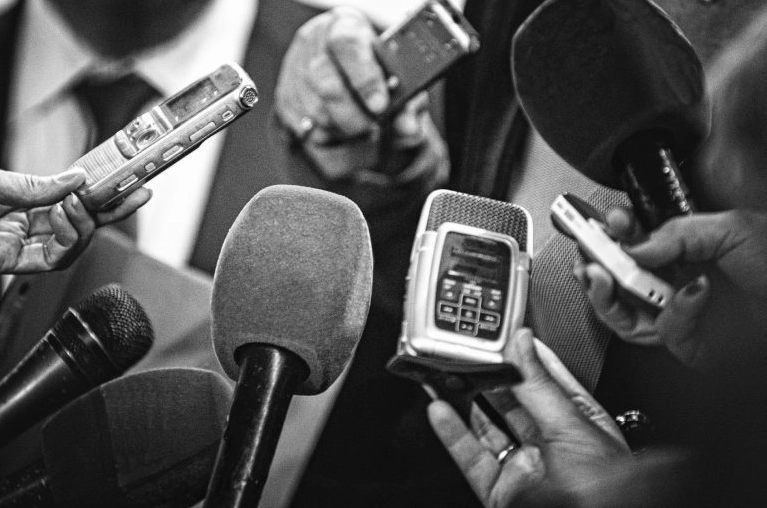Recently, former President Donald Trump abruptly ended an interview with NPR —a U.S. public radio— after being asked about his “big lie” that the 2020 election was “rigged” against him, which did nothing but amplify his propaganda. This demonstrates the risk to journalists, especially those doing live interviews, of interviewing Trump and these types of populist politicians who come so close to fascism.
Historically, the mass media have fought with fascist leaders for control of information to provide other perspectives. However, totalitarian leaders manipulate the independent media to seize power and then eliminate them. So, independent journalists must understand that these are dishonest players who seek to promote their lies rather than answer questions honestly.
Adolf Hitler understood the centrality of propaganda and the importance of controlling the press to maintain power. In Mein Kampf, he wrote, “propaganda must suit the broad masses in content and form, and its soundness must be measured exclusively by its effective result.” For this reason, he also argued that the state “must exercise especially strict control over the press. […] It must not allow itself to be misled by nonsense about so-called freedom of the press.”
Once in power, the Nazis destroyed the independent media, shut down more than 200 newspapers and sent thousands of journalists to prison. As historian Richard Evans explained, “the Publishers Act of October 4, 1933, gave the Nazis total control over the press.”
Once in power, “[Joseph] Goebbels [the Nazi propaganda minister] issued instructions to newspapers every day, outlining what they could and could not publish.” Fascists especially hated journalists because their role should represent the opposite of what fascism stood for. Truth, transparency and freedom of thought are the antithesis of fascism and the new aspirants to facism like Trump, Jair Bolsonaro and Narendra Modi.
In 1932, one of the few American journalists who interviewed Hitler, Hans Kaltenborn, explained that “Adolf Hitler has an intense instinctive aversion to interviews. This man, whose hunches about what to do and whose uncanny sense of when to do it astonish the world, thinks best and decides most shrewdly when he is alone. He dislikes talking to strangers because they intimidate him. He compensates for his shyness with strident self-assertion in their presence. Instead of answering an interviewer’s questions, he delivers excited speeches, thus seeking to create for himself the atmosphere of the public meeting when he is actually at home.”
Kaltenborn expected that his interview with the German dictator would shed light on Nazi operations, in particular on the racist and anti-democratic way of thinking of its leaders. But his questions about Hitler’s anti-Semitism and his views on dictatorship conflicted with a central element of the fascist libretto: the “fuhrerprinzip,” the idea that the leaders are right about everything and that everyone else, including journalists, must accept their explanations without question.
That is why, as Kaltenborn explained, “from the beginning of his public career, Hitler has avoided personal contact with men who disagree with him. He is as conscious of his inability to persuade individuals as he is confident of his ability to appeal to the masses.” Kaltenborn felt he could ask Hitler critical questions. However, uncomfortable with the inquiring, Hitler merely asserted his anti-Semitism, his fascist identification with Mussolini, and his dictatorial vocation. In other words, he simply concentrated on repeating his big lies.
That is why dictators like Hitler preferred to do interviews with those who idolized them, as opposed to doing them with serious and independent journalists, to extend their cult by avoiding critical questions. Argentina’s first dictator José Félix Uriburu, for example, was “interviewed” to legitimize the 1930 coup by falsely framing it as a heroic revolution. The interview helped reinforce the leader’s myth, crystallizing a fictional narrative that became part of the long history of authoritarianism in Argentina.
In 1931, German Jewish writer Emil Ludwig interviewed Benito Mussolini at the height of his dictatorship. Initially, Mussolini saw this as an opportunity to spread his lies abroad, while Ludwig saw it as an opportunity to distance Mussolini from Hitler and to criticize Nazi racism and anti-Semitism. Perhaps, it was Ludwig’s approving and even admiring tone that led Mussolini to let his guard down and openly ridicule Nazi anti-Semitism.
But then Mussolini changed his mind. He blocked the circulation of the interview published as a book and allowed it to be republished only after major changes, for fear of appearing weak in front of journalists and to avoid damaging relations with Hitler.
At the end, Mussolini passed his own racial laws in the fall of 1938 and, as Italian historian Simon Levis Sullam demonstrated, a few years later and under Nazi occupation, the Fascists became key executioners of the Holocaust in Italy. The published interview with Mussolini appeared worldwide in several languages, which helped normalize Mussolini’s image abroad, while silencing it within Italy itself. Consequently, the interview didn’t achieve any positive results, neither within Italy nor internationally despite Ludwig’s good intentions.
In short, fascists and populists historically didn’t favor debate or open access to ideas. They’ve always sought to minimize the relevance of democratic institutions such as the free press. Fascist aspirants like Trump and Bolsonaro have often demonized independent media, but they often do so on those same media platforms, and all too often without facing critical questions.
This is why extreme populists like Trump and Bolsonaro have come to see the independent press as a key adversary of their own politics, but also as a tool of manipulation. The notion of listening to “two bells” often adopted by independent media makes them vulnerable to being used to amplify lies. As history shows, fascist dictators always understood that the role of free media was incompatible with their anti-democratic propaganda, yet they manipulated those same media whenever they were allowed to do so.
Translated from Spanish by Ricardo Aceves.











